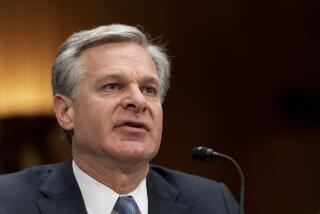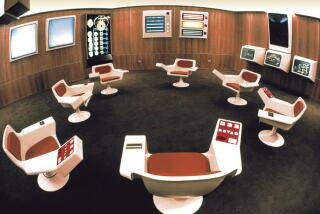LATIN NATIONALISM : Chileans Bristle at Plan for FBI Santiago Office
- Share via
SANTIAGO, Chile — The Chilean television report was titled “The FBI in Action,” and it started with some hard-hitting footage of Kevin Costner and Sean Connery in the movie “The Untouchables.”
But the main focus of the TV report was the intense Chilean debate over plans to create an FBI office in the U.S. Embassy here. The plan has brought protests from both the right and left, based on fears that the FBI may violate Chile’s sovereignty by conducting investigations, operations or arrests in this country.
The controversy shows that the FBI’s “Untouchables” image, and sensitivity about “Yankee imperialism,” are alive and bristling in South America.
Chilean and American officials have been obliged to give repeated assurances that the planned FBI office here will be strictly barred by Chilean law and American regulations from any operational activities, including detective work and arrests.
They stress that the office will make it easier for Chile to receive FBI technical aid and to exchange data, especially about organized criminal activity such as drug trafficking and terrorism.
Interior Minister Enrique Krauss, responsible for Chilean police, told reporters that the FBI operations “will never be carried out in a country like Chile.”
Congressman Jorge Pizarro, a member of Krauss’ Christian Democratic Party, put it another way: “The ‘Untouchables’ are not going to move in here or bring in their team headed by Eliot Ness, no.”
But some opposition politicians remain unconvinced. Conservative Congressman Jaime Ortis told The Times that he opposes the establishment of an FBI office partly because of a danger that it could intervene in internal Chilean affairs. “Always, with any police-type organization in a country outside its own, that risk exists,” Ortis said.
Jorge Insunza, a Communist leader, told a Chilean newspaper that the planned presence of the FBI in Chile “means nothing good, because it has a tradition of repressing alternative political ideas, and since the ‘50s that organization has persecuted American Communist leaders.”
Some criticism of the FBI office apparently reflects sentiments that Krauss referred to as a “nationalist drunken spree” induced by “electioneering juices.” But critics of the plan also point with concern to a 1992 U.S. Supreme Court decision on the abduction of a Mexican physician for trial in California.
The court said the abduction of Dr. Humberto Alvarez Machain did not invalidate his trial on charges of participating in the 1985 torture-murder of U.S. drug agent Enrique S. Camarena. Some Latin Americans interpreted that decision as authorization for American agents to conduct abductions overseas.
But “to conclude from that that the U.S. government condones or advocates kidnaping is not accurate,” a U.S. official said. Charges against Alvarez were dismissed, and he was released.
The FBI’s Chilean office is to be created after construction is finished on a new, $34-million U.S. Embassy in Santiago, some time next year. The office is expected to be staffed by one FBI agent and one secretary. Their role will be that of a liaison between Chilean police and the FBI. That role now is carried out by agents assigned to the U.S. Embassy in Uruguay.
The FBI has agents attached to U.S. embassies in 21 countries, including six in Latin America and the Caribbean.
South of the Border
The FBI has agents attached to U.S. embassies in 21 countries, including six in Latin America and the Caribbean. The agents are responsible to American ambassadors where they are stationed.
1. Mexico City
2. Panama City
3. Bogota, Colombia
4. Caracas, Venezuela
5. Montevideo, Uruguay
6. Bridgetown, Barbados
More to Read
Sign up for Essential California
The most important California stories and recommendations in your inbox every morning.
You may occasionally receive promotional content from the Los Angeles Times.













